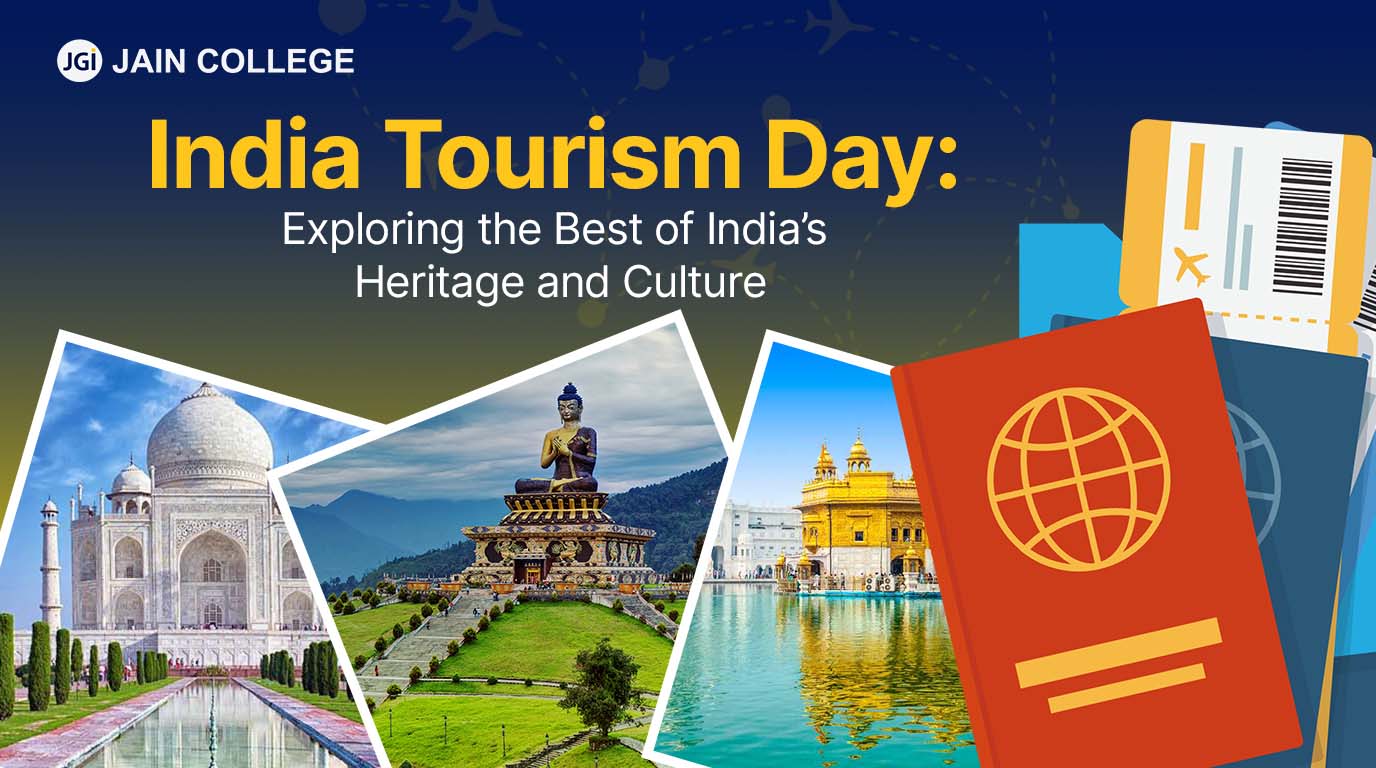
India, a land of colours and diverse traditions with ancient history is a place that offers something unique to every traveller. Celebrated on January 25th annually, India Tourism Day gives importance to the role played by tourism in promoting the country's rich heritage and culture. From breathtaking natural landscapes to historical monuments, India's cultural diversity and traditions make it one of the world's most sought-after destinations.
On this special day, let's talk about some of India's marvellous heritage and cultural experiences that captivate millions of visitors annually.
India is a country whose history dates back thousands of years. Its architectural marvels are a testament to the legacy of ancient civilisations and empires. It is home to 40 UNESCO World Heritage Sites, each telling a unique story.
Taj Mahal, Agra: The white marble tomb, often seen as the 'symbol of love, attracts millions of tourists annually. Shah Jahan, the Mughal emperor, built the mausoleum for his beloved wife, Mumtaz Mahal when she died during her ninth delivery.
Jaipur's Amber Fort: Located atop a hill, this is a breathtaking blend of Rajput and Mughal architecture. Intricate carvings, mirror work, and grand courtyards make this place a must-visit.
Khajuraho Temples, Madhya Pradesh: Khajuraho is a renowned place for intricate carvings depicting art, love, and spirituality in temples of this kind.
Hampi, Karnataka: The ruins of Hampi transport visitors back to the grandeur of the Vijayanagara Empire. Its temples, markets, and royal enclosures glimpse India's prosperous past.
India's culture is as diverse as its geography. Every region has traditions, languages, and festivals that allow visitors to immerse themselves in the local way of life.
Diwali – The Festival of Lights: Celebrated with grandeur across the country, Diwali signifies the victory of light over darkness. The glittering lamps, firecrackers, and traditional sweets create a magical experience for travellers.
Holi – The Festival of Colors: Known worldwide for its vibrant celebrations, Holi is a spring festival where people play with colours and enjoy festive treats. Places like Vrindavan and Mathura offer some of the most memorable Holi experiences.
Pongal in Tamil Nadu: This harvest festival marks the beginning of prosperity and is celebrated with traditional dances, music, and feasts. It provides insight into South India’s agricultural heritage.
Durga Puja in West Bengal: To see the huge Durga idols, cultural programs, and celebrations in Kolkata in Durga Puja is simply unforgettable.
India boasts stunning natural vistas, from snowy mountains to beautiful beaches.
Himalayas: The Himalayan range is meant for trekking, skiing, and meditation. Manali, Leh, and Sikkim are places adventure enthusiasts and peace-seekers visit.
Kerala's Backwaters: Kerala is often called "God's Own Country," its spellbinding backwaters make for an unforgettable travel experience. Houseboat cruises through palm-lined canals are so serene and beautiful.
Rann of Kutch, Gujarat: The white salt desert of Rann of Kutch comes alive during the annual Rann Utsav, which gives ample scope for local art, music, and handicrafts. Nature gets mixed with culture in this festival.
Beaches of Goa: With golden sands and vibrant nightlife, Goa remains one of the favourite places for beach lovers and party animals.
Indian food is a part of India's culture. Every region has its taste and recipes that carry along the history and tradition of that particular place.
North India: Soak buttery naan and aromatic butter chicken or indulge in the spiciness of chaat in Delhi.
South India: Dosas, idlis, and the spiciest Chettinad curries make up this part of Indian food heaven for gourmets.
West India: Sample Gujarati snacks with sweet and salty flavours, or enjoy the seafood extravaganzas of Goa and Maharashtra.
East India: Relish Bengali sweets like rasgulla and sandesh, or savour the simplicity of an Assamese thali.
Food festivals, cooking classes, and street food tours would make great outings in India for any food lover.
The Indian subcontinent is now a global destination and sustainable tourism is an issue of paramount importance. Tourists are encouraged to respect local cultures, support local artisans, and contribute to heritage site preservation. Eco-friendly practices, such as staying in sustainable accommodations and choosing eco-tours, ensure that tourism benefits the local community and protects the environment.
India Tourism Day reminds us of all the treasures India has held for so long. From ancient temples to bustling markets, lush landscapes to mouthwatering cuisine, experiences in India are par excellence.
On this India Tourism Day, do not forget to plan your journey to discover the best of India's heritage and culture. Whether it is a family vacation, a solo adventure, or a spiritual retreat, it promises memories that will last for life.
Go on a discovery and allow India's mystique to embrace your heart.

JAIN PU College, a part of the renowned JGI Group, is committed to empowering students with quality education.
Beyond academics, the college ensures its online content reflects the same standard of excellence. Every blog and article is meticulously vetted and proofread by subject matter experts to ensure accuracy, relevance, and clarity. From insightful educational topics to engaging discussions, JAIN PU College's content is crafted to inform, inspire, and add value to its readers, reflecting the institution's commitment to intellectual growth and innovation.
View all Blogs